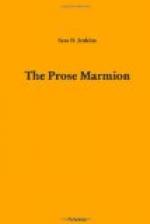“Fitz-Eustace’
heart felt closely pent;
As if to give his rapture
vent,
The spur he to his charger
lent,
And raised
his bridle hand,
And making demivolte
in air,
Cried, ’Where’s
the coward that would not dare
To fight
for such a land!’”
While they gazed the time arrived for King James to take his way to a solemn mass. The distant bells chimed the hour, the fife, the sackbut, the psaltery, the cymbal, the war-pipe, in discordant cry took up the note, and together the sounds rolled up the hillside.
Sir David sighed as he listened.
“I look,” he said, “upon this city, Empress of the North, her palaces, her castles, her stately halls, her holy towers, and think what war’s mischance may bring. These silvery bells may toll the knell of our gallant King. We must not dream that conquest is sure or easily bought. God is ruler of the battlefield, but when yon host begins the combat, wives, mothers, and maids may weep, and priests prepare the death service, for when such a power is led out by such a King, not all will return.”
[Illustration: The grave of sir Walter Scott, DRYBURGH abbey.]
CHAPTER V.
Lindesay now bade the guard open the palisade that closed the tented field, and as into its ample bounds Marmion passed, the warders’ men drew back. The Scottish warriors stared at the strangers, and envy arose at seeing them so well appointed. Such length of shaft, bows so mighty, had never been seen by northern eyes. Little did the Highlanders then think to feel these shafts through links of Scotch mail on Flodden Field.
No less did Marmion and his men marvel that one small country could marshal forth such hosts. Men-at-arms were heavily sheathed in mail. They were like iron towers on Flemish steeds. Young squires and knights practiced their chargers on the plain to pass, to wheel, to curvet, that the swords of their riders might not descend amiss on foeman’s casque. Hardy burghers were there, marching on foot. No waving plume, no crest they wore, but corselet, gorget, and brigantine, brightly burnished. The yeomen, too, were on foot, yet dressed in steel. Each at his back carried forty days’ provisions. His arms were the halbert, axe, or spear, a crossbow, a dagger, or a sword. Each seemed almost sad at leaving the dear cottage, the simple pleasures and duties of home, to march into a foreign land. It was not cowardice, not terror, for the more they loved Scotland the more fiercely would they fight.
Quite another class was the Borderer, bred to war. He joyed to hear the roar of battle. No harp, no lute, could please his ear as did the loud slogan. Nobles might fight for fame, vassals might follow, burghers might guard their townships, but to a battle the Borderer joyfully took his way as to a game, scarce caring who might win the day.




